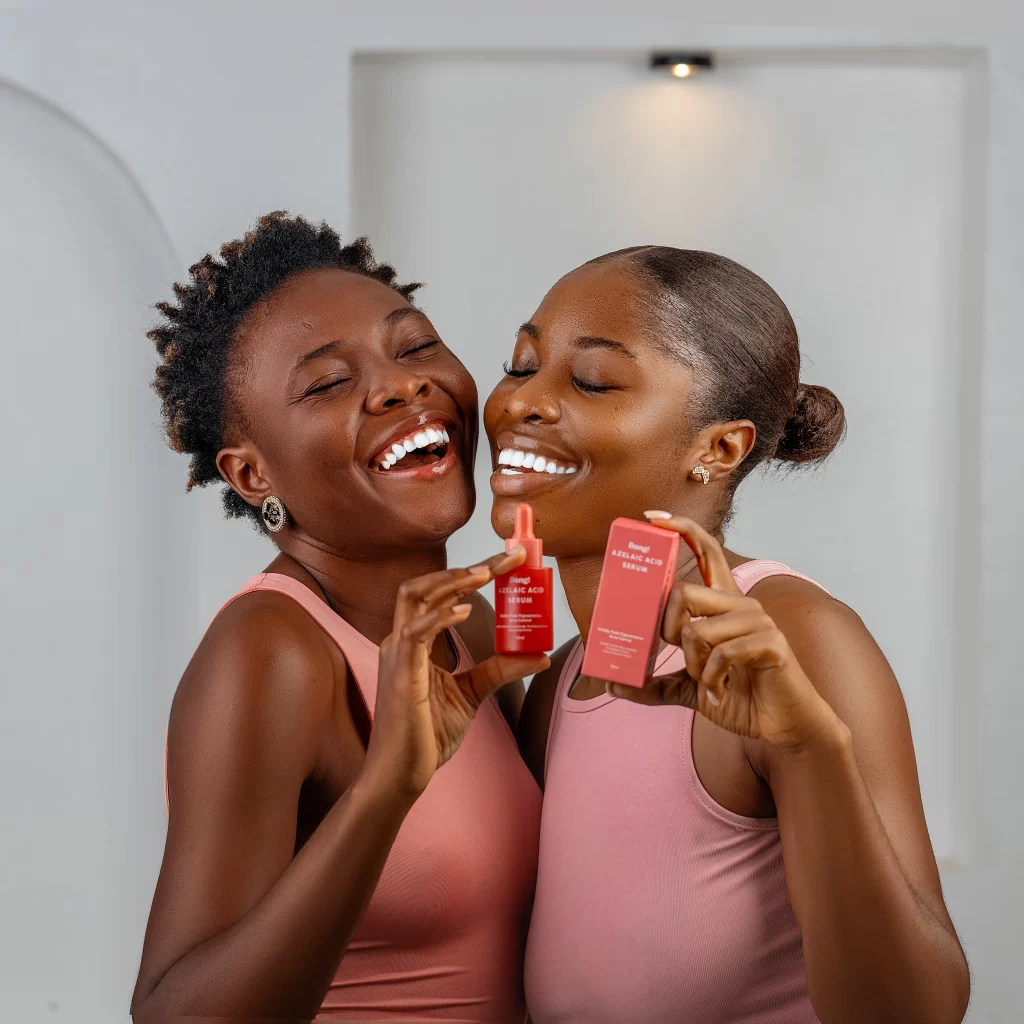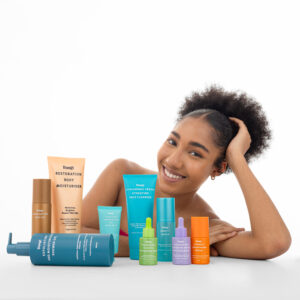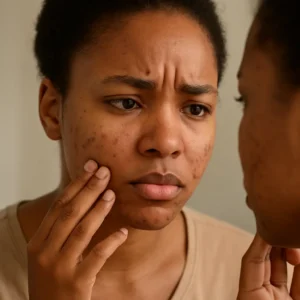
Free Shipping on Orders Over N200,0000 within Lagos
Buy 300k and get 20% off any spa service
Free Shipping For Orders over $150
Free Shipping For Orders over £100

Just how do you get rid of hyperpigmentation in summer? By using the right skincare products combined with expert advice, you should be able to overcome this.
You see, hyperpigmentation is bound to happen in summer. Why is this so? Summer means more sun, and the sun’s ultraviolet (UV) rays trigger our skin cells to produce more melanin.
Melanin is the pigment that gives skin its colour, but overproduction can lead to darker patches or spots. This is why, in summer you tend to notice more freckles and dark brown patches on exposed parts of your body like face, neck, arms, and feet.
Thankfully, there’s a way to overcome this issue. By combining sun protection with targeted skincare products, you can effectively manage hyperpigmentation, even during the sunny summer months. Let’s dive right in to discover how to manage hyperpigmentation in summer using the right skincare products and practices.
Ultimately, to get rid of hyperpigmentation in summer do these 4 things. Use sunscreen, reduce exposure to the sun/wear protective clothes if you must go out, use brightening products and exfoliate regularly. Also, remember that skincare isn’t magic. It requires patience and consistency to reap the long-term benefits.
Hyperpigmentation happens due to the overproduction of melanin. Melanin is the pigment responsible for skin color.
Melanin is quite beneficial for the skin. It acts as a protective mechanism against UV radiation. However, excessive melanin production can lead to uneven skin tone and dark patches (hyperpigmentation).
This can result from various factors, including sun exposure, hormonal changes, and skin injuries. Let’s explore these factors further.
UV radiation is a major trigger for hyperpigmentation. It penetrates the skin and stimulates melanocytes, the cells responsible for melanin production.
Prolonged sun exposure, common in summer, increases this melanin production, leading to dark spots and uneven skin tone.
Heat can also contribute to hyperpigmentation. High temperatures cause inflammation and vasodilation (widening of blood vessels), which can lead to increased melanin production.
Additionally, sweating can cause irritation and friction, especially in areas like the face, neck, and underarms, making hyperpigmentation worse.
Thankfully, there are ways to prevent or manage hyperpigmentation to enjoy radiant skin all year long.
Follow these simple steps for your morning routine.
Start your day with a gentle face wash and body wash to remove sweat, oil, and impurities without stripping the skin’s natural barrier.
Most people like to skip using a toner but it is essential if you want to get the best out of your skincare routine. A toner helps to balance skin pH levels, removes leftover dirt on the skin, and provides extra moisture.
So, include a toner in your routine.
Incorporate an antioxidant serum, such as Vitamin C, into your morning routine. Vitamin C is known for its brightening properties and its ability to neutralize free radicals caused by UV radiation.
Aside from vitamin C, serums like niacinamide and azelaic also target hyperpigmentation, leading to a brighter complexion. Better still, they can complement each other.
You can apply your niacinamide a few minutes after applying vitamin C serum.
The benefits of a moisturizer in a skincare routine are numerous. From hydrating the skin to protecting the skin barrier, and enhancing your overall routine. Particularly, moisturizers containing ingredients like ceramides, lipids, and fatty acids can help reinforce the skin’s natural barrier, keeping it strong and resilient, all day long.
Overall, ensure you’re using the right type of moisturizer for your skin type.
Apply a broad-spectrum sunscreen with an SPF of at least 30. Sunscreen protects the skin from both UVA and UVB rays, which are known to worsen hyperpigmentation.
Reapply every two hours, especially if you are outdoors and use the right type of sunscreen for your skin type.
If you have oily skin, use a mineral sunscreen. If you have dry skin, a chemical sunscreen is best.
This is what your PM routine should look like.
Cleanse your skin to get rid of dirt and use your toner to improve your skin’s pH level.
Exfoliation is best done at night because exposure to sun after exfoliating can increase your risk of hyperpigmentation. We recommend using chemical exfoliants instead of physical exfoliants because they’re gentle and less likely to cause irritation.
Use exfoliants like mandelic acid or retinoids to remove dead skin cells and promote cell turnover. This helps in fading dark spots over time.
Remember to use only 2-3 times a week to avoid over-exfoliation.
Azelaic acid is an excellent acne and hyperpigmentation treatment acne. As such, it will be beneficial to include it in your routine. Just like in the morning routine, after your
Use moisturizers that contain ingredients like ceramides and hyaluronic acid to repair and strengthen the skin barrier, ensuring it remains hydrated and resilient.
Conclusion
Managing hyperpigmentation in the summer requires a consistent and science-backed skincare routine. By understanding the causes and effects of hyperpigmentation and following expert-recommended practices, you can effectively reduce dark spots and achieve a more even skin tone.
Remember, consulting with a skin care professional can provide personalized advice tailored to your specific skin needs, ensuring the best possible results.
Yes, Vitamin C is effective for treating hyperpigmentation as it prevents melanin production and brightens the skin. It also protects against UV damage, preventing further pigmentation issues.
Serums with Vitamin C, niacinamide, and azelaic acid are the best serums to even out skin tone.
Body creams with brightening and exfoliating ingredients like the Dang Ageless Restoration Body Moisturizer are good for hyperpigmentation. This lotion is enriched with niacinamide, kojic acid, & n-acetyl glucosamine (NAG) to gently brighten your skin and even out your skin tone. Moreover, it is suitable for all skin types.
Yes, hyperpigmentation can be reversed with consistent use of treatments like Vitamin C,, and retinoids Procedures such as chemical peels and laser therapy can also significantly reduce hyperpigmentation.
Mild hyperpigmentation can begin to fade within a few weeks to months with proper treatment. More severe cases may take several months to a year or more to see significant improvement.




